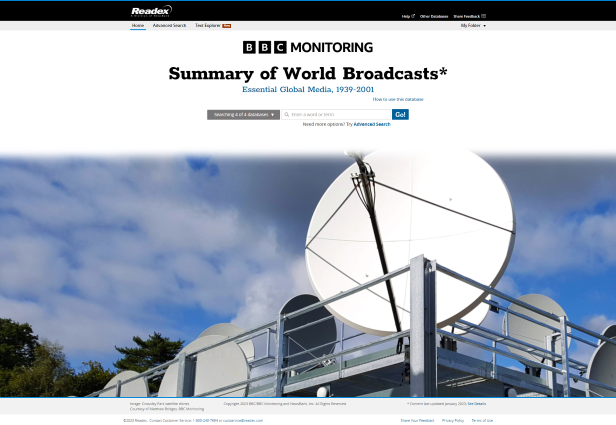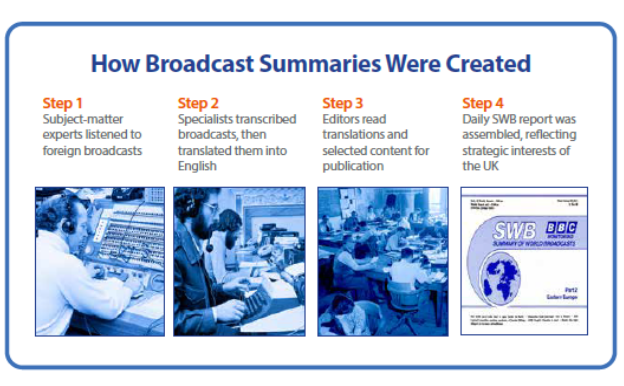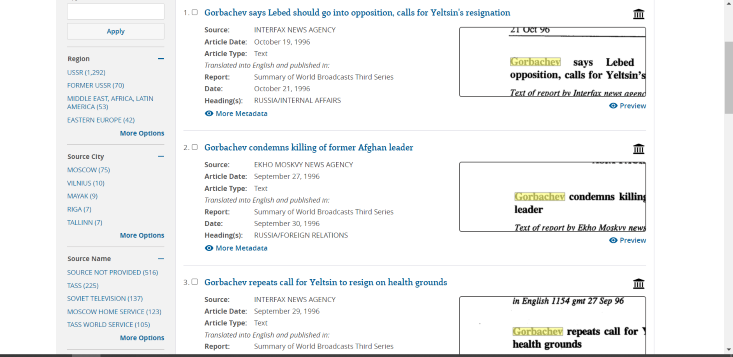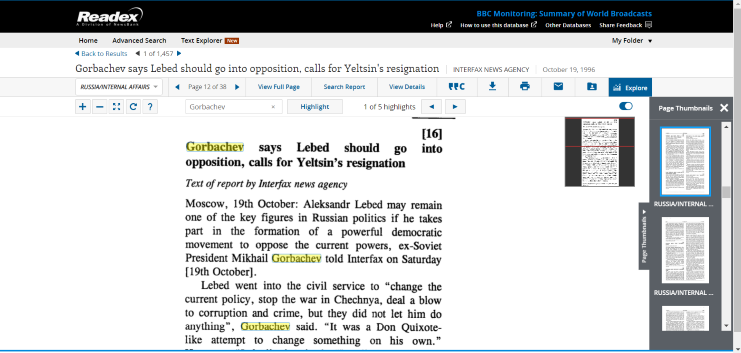Introducing BBC Monitoring: Summary of World Broadcasts
Readex is excited to announce the release of BBC Monitoring: Summary of World Broadcasts, 1939-2001. Created in partnership with the BBC and digitized from the complete physical materials archive preserved at the BBC Written Archives Centre in Reading, England, this exceptional resource captures more than 60 years of turbulent 20th century global history, as it unfolded.

BBC Monitoring: Origins and Scope
Founded in 1939 at the start of WWII, the purpose of BBC Monitoring was to listen to radio broadcasts and gather open-source intelligence to help Britain and its allies understand global dynamics and assess emerging global threats and capabilities. Over the next 60 years, the scope of its monitoring grew quickly. Trained specialists transcribed broadcasts of speeches, current affairs, political discussions, and social and cultural events worldwide. Transcripts, in turn, were translated into English, then read by experts who carefully selected critical content for publication. Lastly, selections were summarized and curated into daily reports that comprise the Summary of World Broadcasts. These original daily reports often included commentary and evaluation by subject-matter experts, as well as synopses and specialist briefings.

The research value of open-source intelligence
Open-source intelligence is non-covert information gathered from publicly available sources. From its inception, BBC Monitoring played an important role in the gathering, transcribing, and translating of open-source intelligence. Its daily reports enabled government and policy officials to explain policy decisions, facilitate communication with foreign officials without compromising intelligence sources, and assess global threats more quickly.
Comprising 70,000 individual multi-page daily reports containing millions of individual broadcasts, the digital archive of Summary of World Broadcasts puts this abundant critical intelligence into the hands of scholars for the first time ever, inspiring new research opportunities and investigative possibilities.
Value for scholars and researchers
Daily digests of radio and television broadcasts are vital primary sources for scholars of 20th-century political, social, cultural, and economic history. Researchers will gain unmatched insights and new perspectives into key regions and global events, including WWII, the Cold War, Communist China, the Middle East, Chernobyl, Ukraine, and the Soviet Union/Russia with this rarely seen archive.


A distinctive, valuable addition to any research collection
Five compelling reasons to add this collection to your library holdings:
- Delivers previously inaccessible perspectives to inform scholarly research across all academic disciplines
- Provides unique global views rooted in first-hand, open-source intelligence gathering
- Gives particular attention to the viewpoints and mindsets of local populations
- Offers essential background for interpreting today’s global events – the context behind how we got to where we are now
- Reveals and tracks key 20th-century events as they developed over days, months, or years
Additional resources
To learn more about the history and activities of BBC Monitoring, visit the links below.
BBC Monitoring promotion video circa 1985
- Blog: BBC Monitoring at 80
- Imperial War Museum: Listening to the World: BBC Monitoring Collection AHRC Research Network
- Blog: Tracing Global History through the BBC Monitoring Service
Visit the Readex BBC Monitoring: Summary of World Broadcasts page for more information about making this collection available at your institution or to schedule a complimentary trial.



